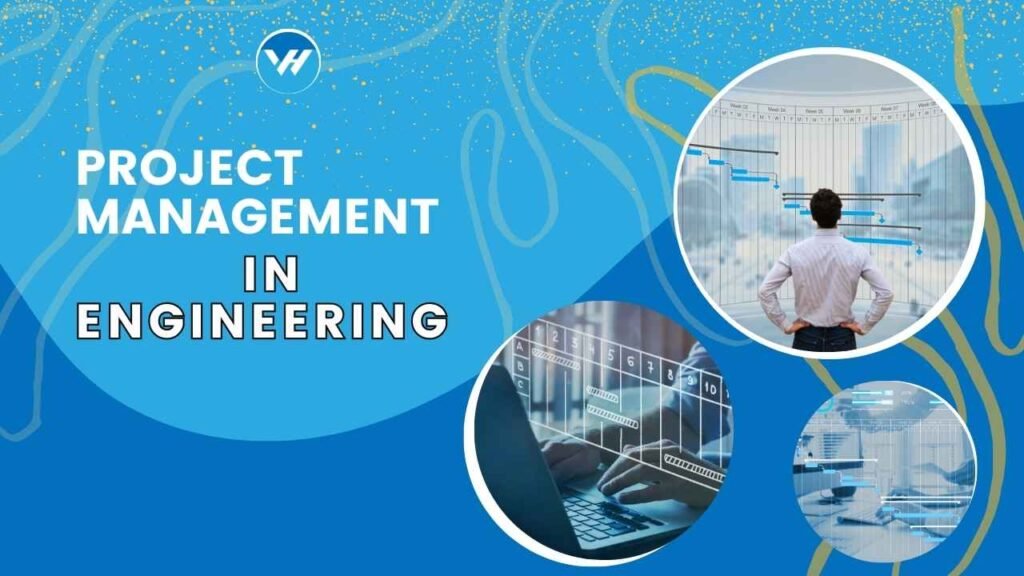Ever wondered what keeps those colossal engineering projects on track? Whether it’s constructing a skyscraper, designing a new bridge, or developing a cutting-edge piece of technology, project management is the unsung hero behind the scenes. Project management in engineering is like the conductor of an orchestra, ensuring every piece works in harmony to create a masterpiece.

Table of Contents
ToggleUnderstanding Project Management Basics
Before we dive deep, let’s get our basics straight. Project management in engineering involves planning, executing, and overseeing projects to meet specific goals and criteria. It’s not just about getting the job done but doing it efficiently, within budget, and on time.
Definition and Core Concepts
At its core, project management revolves around four main components: scope, time, cost, and quality. Think of these as the four legs of a sturdy table; if one is wobbly, the whole project can falter.
Key Components: Scope, Time, Cost, Quality
- Scope: Defines what needs to be done. It’s the project’s boundaries and deliverables.
- Time: Involves scheduling tasks and ensuring timely completion.
- Cost: Encompasses budgeting and managing expenses.
- Quality: Ensures that the project’s outcomes meet the required standards and criteria.
Phases of Project Management
Every engineering project goes through several distinct phases. Each phase is crucial and builds on the previous one.
Initiation
This is where it all begins. It’s the phase where ideas start taking shape into a project with clear objectives.
Defining Project Goals
Setting clear, achievable goals is like setting a destination for your journey. Without it, you might wander aimlessly. The goals should be specific, measurable, achievable, relevant, and time-bound (SMART).
Stakeholder Analysis
Identifying and understanding the needs and expectations of everyone involved or affected by the project is crucial. Stakeholders can include clients, team members, suppliers, and even the local community.
Planning
Failing to plan is planning to fail, right? This phase involves laying down the roadmap for achieving the project goals.
Project Plan Development
Creating a comprehensive plan that outlines how to achieve the project goals. This includes detailed timelines, milestones, and deliverables.
Resource Allocation
Determining what resources (time, money, people) are needed and how they’ll be utilized. Efficient resource allocation ensures that the project has what it needs to proceed smoothly.
Execution
Time to get your hands dirty. This phase is all about putting the plan into action.
Task Assignment
Assigning specific tasks to team members based on their skills and expertise. Clear task assignments help in avoiding confusion and ensuring accountability.
Team Coordination
Ensuring everyone is on the same page and working harmoniously. Effective coordination helps in preventing bottlenecks and ensuring smooth workflow.
Monitoring and Controlling
Keeping a watchful eye on the project’s progress to ensure everything is on track.
Progress Tracking
Regularly checking if the project is on track according to the plan. This involves tracking milestones, deliverables, and deadlines.
Quality Assurance
Making sure the work meets the required standards. Quality assurance processes help in identifying and rectifying defects early.
Closing
Wrapping things up neatly and ensuring all project aspects are completed.
Final Deliverables
Completing and handing over the finished project to the client or stakeholders.
Project Evaluation
Reviewing what went well and what could be improved for future projects. This phase often involves a final project report and a post-mortem analysis.
Role of a Project Manager in Engineering
The project manager is the glue that holds everything together. They are responsible for overseeing the entire project and ensuring it meets its objectives.
Skills and Qualities Required
A good project manager needs a mix of technical know-how, leadership skills, and the ability to communicate effectively. They should be adept at problem-solving and decision-making.
Responsibilities and Duties
From planning and executing to monitoring and closing, the project manager is involved in every step. Their duties include resource management, risk management, and ensuring the project stays on track.
Project Management Methodologies
There are several methodologies, each with its own strengths and weaknesses. The choice of methodology often depends on the project’s requirements and the team’s preferences.
Waterfall Model
A linear approach where each phase must be completed before moving on to the next. It’s best for projects with well-defined requirements.
Agile Methodology
A flexible, iterative approach that allows for changes and continuous improvement. Agile is great for projects where requirements might evolve over time.
Lean Project Management
Focuses on minimizing waste and maximizing value. It emphasizes efficiency and continuous improvement.
Six Sigma
A data-driven approach aimed at improving quality by eliminating defects. It uses statistical methods to identify and remove the causes of defects.
Tools and Software for Project Management
Modern technology offers a plethora of tools to streamline project management. These tools help in planning, scheduling, resource allocation, and communication.
Popular Project Management Tools
Software like Trello, Asana, and Microsoft Project are popular choices. They provide features for task management, collaboration, and tracking.
Benefits of Using PM Software
These tools help in organizing and automating many aspects of project management. They improve efficiency, collaboration, and ensure better tracking and reporting.
Risk Management in Engineering Projects
Risks are inevitable, but they can be managed effectively to minimize their impact on the project.
Identifying Risks
The first step is to identify potential risks that could impact the project. This includes technical risks, financial risks, and external risks.
Risk Mitigation Strategies
Once identified, strategies need to be developed to minimize or eliminate these risks. This could involve contingency planning, risk transfer, or risk avoidance.
Budgeting and Cost Control
Keeping an eye on the finances is crucial for project success. Proper budgeting and cost control help in ensuring that the project remains financially viable.
Importance of Budgeting
A well-planned budget ensures that the project has the necessary funds at each stage. It helps in preventing financial shortfalls and ensures smooth progress.
Techniques for Cost Control
Regularly reviewing expenses and making adjustments as needed helps in keeping the project within budget. Techniques like cost estimation, cost forecasting, and variance analysis are commonly used.
Time Management
Time is of the essence in any project. Effective time management ensures that the project is completed on schedule.
Scheduling Techniques
Using Gantt charts, critical path analysis, and other tools to create effective schedules. These techniques help in visualizing the project timeline and identifying critical tasks.
Meeting Deadlines
Ensuring tasks are completed on time to keep the project on track. This often involves setting realistic deadlines and closely monitoring progress.
Quality Management
Delivering a high-quality product is essential for project success. Quality management involves ensuring that the project meets the required standards.
Ensuring Quality in Engineering Projects
Implementing quality control measures at each stage of the project. This involves regular inspections, testing, and reviews.
Standards and Best Practices
Adhering to industry standards and best practices to ensure high-quality outcomes. This helps in maintaining consistency and reliability.
Communication in Project Management
Good communication can make or break a project. Effective communication ensures that everyone is on the same page and working towards the same goals.
Importance of Effective Communication
Clear, concise communication ensures that everyone understands their roles and responsibilities. It helps in preventing misunderstandings and conflicts.
Tools for Better Communication
Using tools like Slack, Zoom, and email effectively to maintain open lines of communication. These tools facilitate real-time collaboration and information sharing.
Team Management
A project is only as good as the team behind it. Effective team management ensures that the team works efficiently and harmoniously.
Building an Effective Team
Selecting the right people with the necessary skills and expertise. It also involves fostering a positive team culture and promoting collaboration.
Conflict Resolution
Addressing and resolving conflicts quickly to maintain a positive working environment. This involves effective communication, negotiation, and problem-solving skills.
Future Trends in Project Management in Engineering
The field is always evolving, with new trends and technologies shaping the future.
Technological Advancements
Emerging technologies like AI and machine learning are set to revolutionize project management. They can provide advanced data analysis, predictive analytics, and automation.
Changing Roles of Project Managers
As technology advances, the role of project managers is also changing. They need to adapt to new tools and methodologies, and continuously develop their skills.
Conclusion
Project management in engineering is a complex but rewarding field. By understanding the basics, following best practices, and continuously learning and adapting, project managers can ensure the success of their projects. Effective project management not only ensures the timely and efficient completion of projects but also contributes to the overall success and growth of engineering firms.
FAQs
What are the main phases of project management?
- The main phases are Initiation, Planning, Execution, Monitoring and Controlling, and Closing. Each phase plays a critical role in the successful completion of a project.
How does risk management contribute to project success?
- By identifying and mitigating risks, projects can avoid potential pitfalls and stay on track. Effective risk management ensures that unexpected issues do not derail the project.
What tools are essential for effective project management?
- Tools like Trello, Asana, and Microsoft Project help in planning, scheduling, and communication.
How can one improve communication within a project team?
- Using communication tools effectively and ensuring clear, concise communication can improve team coordination.
What are some common challenges in project management and how to overcome them?
- Challenges include scope creep, budget overruns, and missed deadlines. Overcoming them requires careful planning, monitoring, and adaptability.





